- 12th February, 2025
- By Rob Lawson
Marketing Mastery: Guide to B2B and B2C Business Growth

Hello, dear readers! this article dives into a crucial topic for entrepreneurs and marketers: understanding the difference between B2B (business-to-business) and B2C (business-to-consumer) marketing strategies. These acronyms may seem straightforward, but the implications for your marketing strategy are profound. Whether you're navigating the complexities of building long-term partnerships in the B2B world or crafting emotionally resonant messages to capture the attention of individual consumers in the B2C landscape, mastering these approaches is essential for driving sustainable business growth.
What is B2B Marketing?
B2B marketing, or business-to-business marketing, is the process of one business promoting its products or services to other businesses. It's how companies generate demand for their offerings within the business community, rather than targeting individual consumers
Reference for the layout of key features of b2b marketing
Key Characteristics of B2B Marketing:





Imagine a company that makes super-efficient, high-tech coffee machines. Now, they wouldn't market these machines the same way they'd market to you and me, right? Instead of focusing on how delicious the coffee tastes, they'd target businesses, highlighting how these machines can boost office productivity by keeping employees energized and happy. That's B2B marketing in a nutshell!
What is B2C Marketing?
B2C marketing is the set of tactics and strategies companies use to promote their products or services to individual consumers, focusing on driving sales and building lasting relationships with customers. B2C marketing is a dynamic and creative field that constantly evolves with consumer trends and technology. It's about understanding what makes people tick and creating compelling messages that resonate with their desires and aspirations.
Reference for the layout of key features of b2b marketing
Key Characteristics of B2B Marketing:
Here's a breakdown of what makes B2C marketing tick:





Imagine you're scrolling through your Instagram feed and seeing an ad for a stylish new pair of shoes. You click on it, and suddenly you're browsing an online store, adding those shoes to your cart, and checking out within minutes. That's B2C marketing at work! Business-to-consumer marketing is how companies like Nike, Netflix, or your local grocery store get you to buy their products or services.
B2B vs. B2C: Two Sides of the Same Coin
When it comes to marketing, understanding the distinction between B2B and B2C strategies is essential. B2B (business-to-business) focuses on creating value for other companies by offering solutions that enhance their operations, boost efficiency, or address specific challenges. It's about building strong relationships and delivering measurable results for business clients.
On the other hand, B2C (business-to-consumer) is centered on directly connecting with individual consumers. This approach emphasizes addressing their immediate needs, fulfilling their desires, and creating an engaging, seamless experience that resonates on a personal level. By mastering the nuances of both, businesses can unlock their true growth potential.
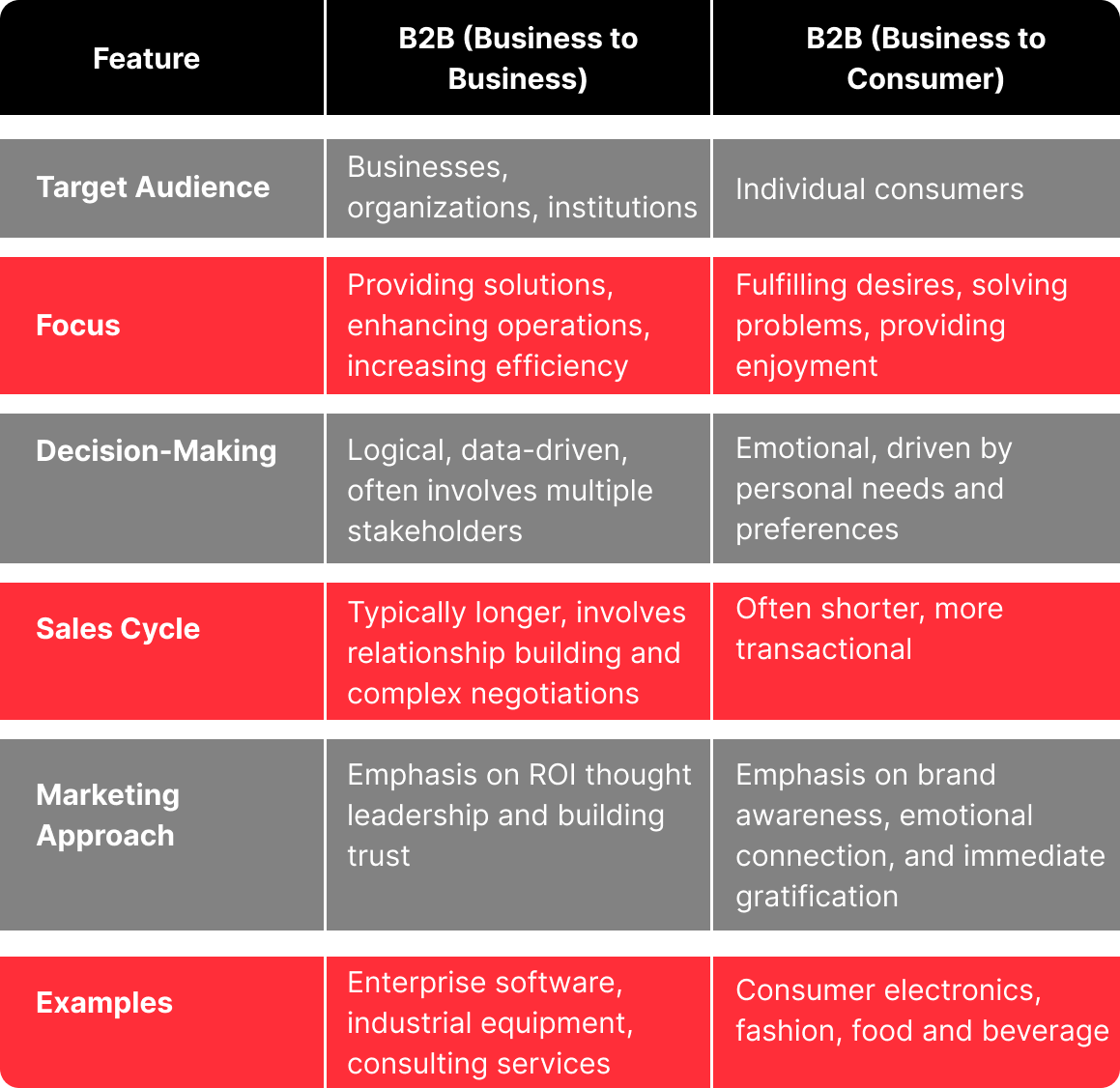
Whether you're in B2B, B2C, or a mix of both, your strategies and digital tactics will differ significantly. This distinction is increasingly important given the evolving digital landscape.
The Rise of Channel Conflicts:
Traditionally, companies like software giants relied on channel partners and authorized resellers to distribute their products. Customers rarely, if ever, purchased directly from the source. But then came the internet, a disruptive force that has changed the rules of the game by eliminating many of these middlemen.
Now, businesses that were once strictly B2B are finding themselves in the B2C arena as well. This shift has led to what's sometimes called "channel conflict" where companies compete with their own distributors. It's a delicate balance, as businesses must navigate the complexities of maintaining partner relationships while adapting to a market that increasingly demands direct sales.
Decoding the Digital Divide in B2B & B2C
So, how do we tackle this in the digital marketing world? For B2B, it's all about problem-solving. You're helping your clients move away from their pain points. The approach is often educational and consultative, showcasing how your solutions can alleviate their specific issues.
Conversely, B2C marketing is about aspiration and enjoyment. It's about showing potential customers how their lives will be enhanced by your product—how they'll feel better, look better, or have more fun. This influences everything from the media we choose to the language and imagery we use, all the way down to the technology that powers your website.
5 Key Differences Between B2B Digital Marketing and B2C Digital Marketing
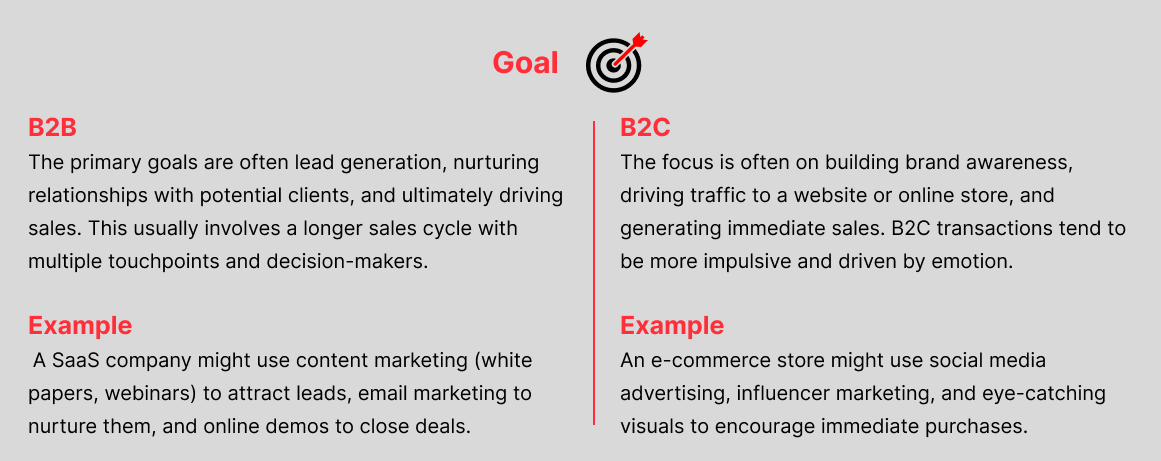
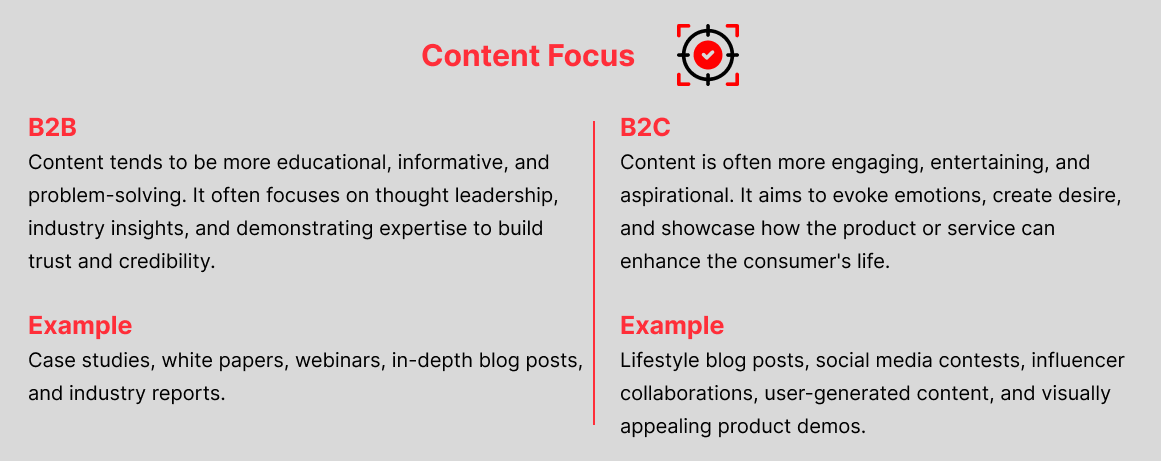
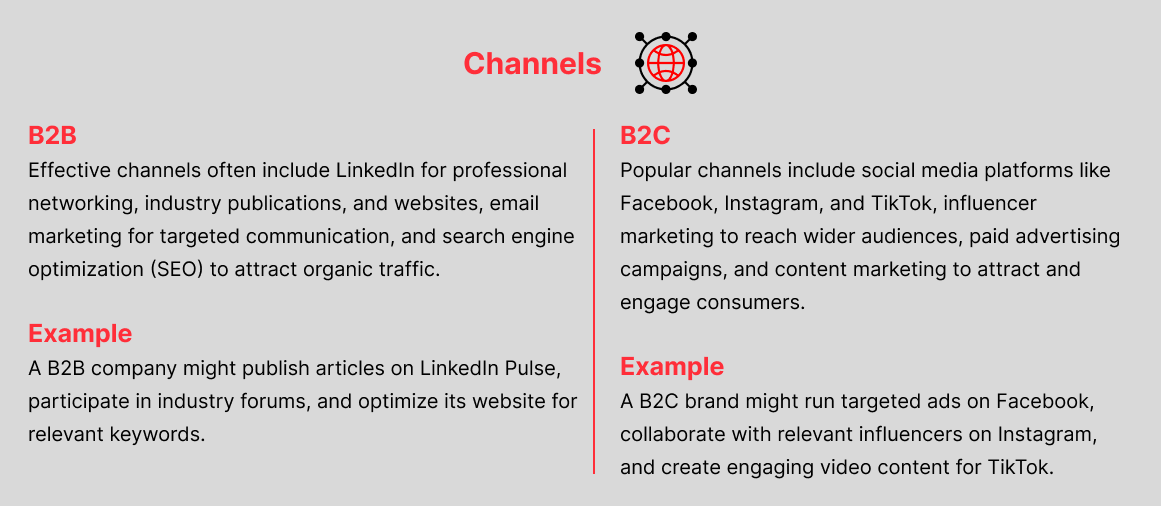
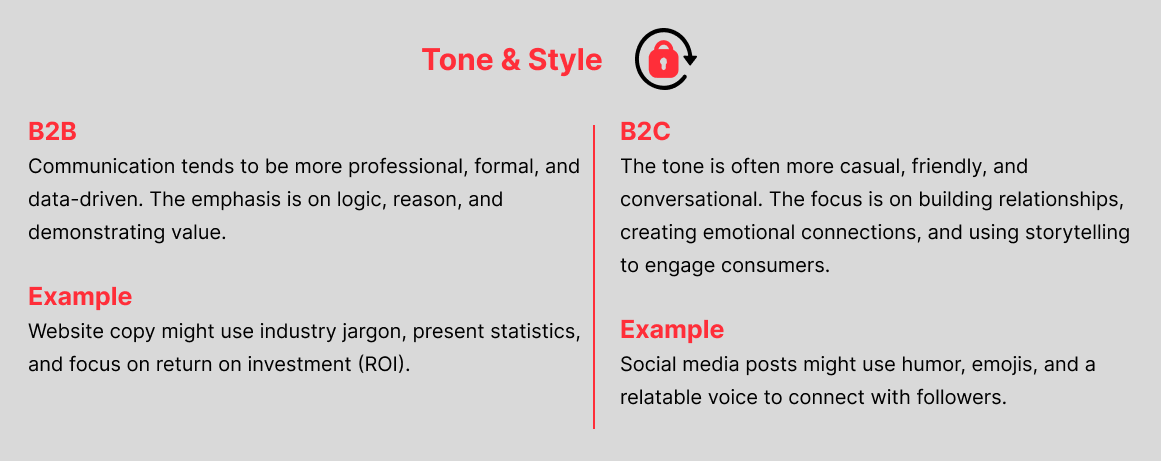
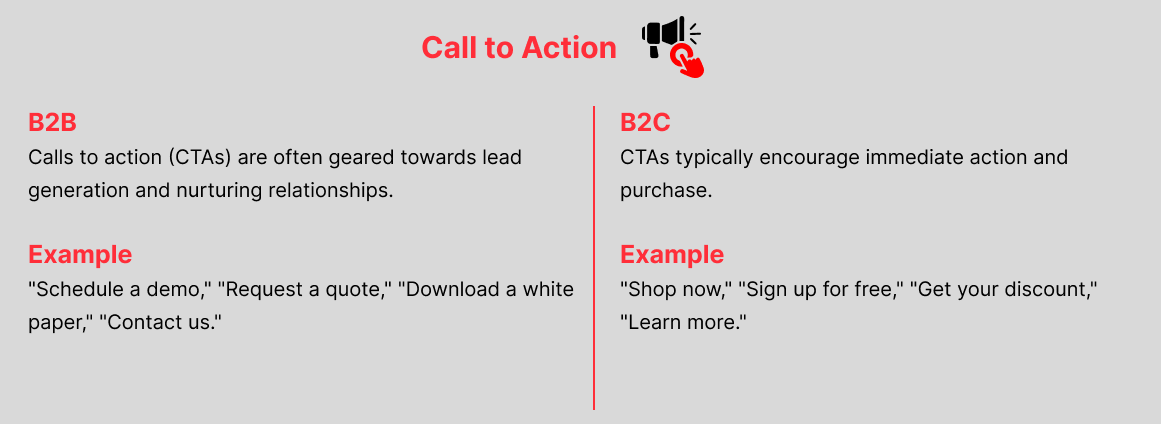
By understanding these key differences, businesses can tailor their digital marketing strategies to effectively reach and engage their target audience, whether it's other businesses or individual consumers.
Let’s team up to create B2B and B2C marketing strategies that drive growth
Crafting a strategy that aligns with these modern demands is no small feat. It requires a significant investment of time and resources, dedicated research into your target audience and competitive landscape, and a deep understanding of the ever-evolving digital marketing landscape. But fear not, this is a journey many businesses are on, and it can lead to significant growth and success.
If you're seeking guidance on how to navigate the B2B and B2C marketing maze, you're not alone. Our Team specializes in helping businesses of all sizes – from startups to established enterprises – develop and implement effective marketing strategies that drive measurable results. We can help you with everything from identifying your ideal customer profiles and crafting compelling content to selecting the right marketing channels and measuring your return on investment.
Hope this insight has been helpful. Until next time, keep innovating and experimenting with new approaches to reach your target audience. Don't be afraid to try new things, analyze your results, and continually refine your strategies to achieve optimal performance.
Reach out for a consultation, and let's explore how we can tailor a digital marketing strategy that positions your business for the future.
At Digital Assassin, we specialize in developing tailored digital marketing strategies that drive results for both B2B and B2C businesses. Whether you're focused on building long-term business relationships or engaging directly with consumers, our services are designed to meet your goals. We offer end-to-end solutions including SEO, website development, social media marketing, Google Ads management, content creation, and email marketing. Our team works closely with you to understand your target audience and deliver campaigns that boost visibility, generate leads, and convert traffic into loyal customers. Let us help you grow your brand in today’s dynamic digital landscape.